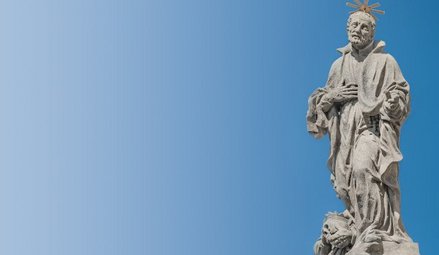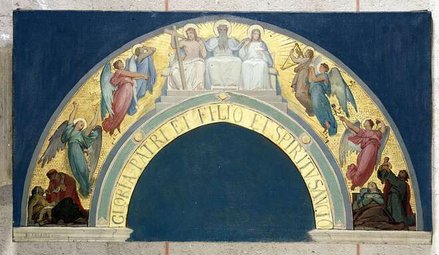- By theme
- Jesus
- The many proofs of Christ’s resurrection
- Saint Thomas Aquinas: God gave all the divine proofs we needed to believe
- The surpassing power of Christ's word
- Lewis’s trilemma: a proof of Jesus’s divinity
- God saves: the power of the holy name of Jesus
- Jesus spoke and acted as God's equal
- Jesus' divinity is actually implied in the Koran
- Jesus came at the perfect time of history
- Rabbinical sources testify to Jesus' miracles
- Mary
- The Church
- The Bible
- An enduring prophecy and a series of miraculous events preventing the reconstruction of the Temple
- The authors of the Gospels were either eyewitnesses or close contacts of those eyewitnesses
- Onomastics support the historical reliability of the Gospels
- The New Testament was not altered
- The New Testament is the best-attested manuscript of Antiquity
- The Gospels were written too early after the facts to be legends
- Archaeological finds confirm the reliability of the New Testament
- The criterion of embarrassment proves that the Gospels tell the truth
- The dissimilarity criterion strengthens the case for the historical reliability of the Gospels
- 84 details in Acts verified by historical and archaeological sources
- The unique prophecies that announced the Messiah
- The time of the coming of the Messiah was accurately prophesied
- The prophet Isaiah's ultra accurate description of the Messiah's sufferings
- Daniel's "Son of Man" is a portrait of Christ
- The Apostles
- Saint Peter, prince of the apostles
- Saint John the Apostle: an Evangelist and Theologian who deserves to be better known (d. 100)
- Saint Matthew, apostle, evangelist and martyr (d. 61)
- James the Just, “brother” of the Lord, apostle and martyr (d. 62 AD)
- Saint Matthias replaces Judas as an apostle (d. 63)
- The martyrs
- The protomartyr Saint Stephen (d. 31)
- Polycarp, bishop of Smyrna, disciple of John and martyr (d. 155)
- Justin Martyr: philosopher and apologist (d.165)
- Saint Blandina and the Martyrs of Lyon: the fortitude of faith (177 AD)
- Saint Agatha stops a volcano from destroying the city of Catania (d. 251)
- Saint Lucy of Syracuse, virgin and martyr for Christ (d. 304)
- Saint Boniface propagates Christianity in Germany (d. 754)
- Thomas More: “The king’s good servant, but God’s first”
- The martyrdom of Paul Miki and his companions (d. 1597)
- The martyrs of Angers and Avrillé (1794)
- The Martyrs of Compiègne (1794)
- The Vietnamese martyrs Father Andrew Dung-Lac and his 116 companions (17th-19th centuries)
- He braved torture to atone for his apostasy (d. 1818)
- Blaise Marmoiton: the epic journey of a missionary to New Caledonia (d. 1847)
- The Uganda martyrs: a recurring pattern in the persecution of Christians (1885)
- José Luis Sanchez del Rio, martyred at age 14 for Christ the King (d. 1928)
- Saint Maximilian Kolbe, Knight of the Immaculate (d. 1941)
- The monks
- The Desert Fathers (3rd century)
- Saint Anthony of the Desert, a father of monasticism (d. 356)
- Saint Benedict, father of Western monasticism (d. 550)
- Saint Bruno the Carthusian (d.1101): the miracle of a hidden life
- Blessed Angelo Agostini Mazzinghi: the Carmelite with flowers pouring from his mouth (d. 1438)
- Monk Abel of Valaam's accurate prophecies about Russia (d. 1841)
- The more than 33,000 miracles of Saint Charbel Maklouf (d. 1898)
- Saint Pio of Pietrelcina (d. 1968): How God worked wonders through "a poor brother who prays"
- The surprising death of Father Emmanuel de Floris (d. 1992)
- The prophecies of Saint Paisios of Mount Athos (d. 1994)
- The saints
- Saints Anne and Joachim, parents of the Virgin Mary (19 BC)
- Saint Nazarius, apostle and martyr (d. 68 or 70)
- Ignatius of Antioch: successor of the apostles and witness to the Gospel (d. 117)
- Saint Gregory the Miracle-Worker (d. 270)
- Saint Martin of Tours: patron saint of France, father of monasticism in Gaul, and the first great leader of Western monasticism (d. 397)
- Saint Augustine of Canterbury evangelises England (d. 604)
- Saint Lupus, the bishop who saved his city from the Huns (d. 623)
- Saint Rainerius of Pisa: from musician to merchant to saint (d. 1160)
- Saint Dominic of Guzman (d.1221): an athlete of the faith
- Saint Francis, the poor man of Assisi (d. 1226)
- Saint Anthony of Padua: "everyone’s saint"
- Saint Rose of Viterbo or How prayer can transform the world (d. 1252)
- Saint Simon Stock receives the scapular of Mount Carmel from the hands of the Virgin Mary
- The unusual boat of Saint Basil of Ryazan
- Saint Agnes of Montepulciano's complete God-confidence (d. 1317)
- The extraordinary conversion of Michelina of Pesaro
- Saint Peter Thomas (d. 1366): a steadfast trust in the Virgin Mary
- Saint Rita of Cascia: hoping against all hope
- Saint Catherine of Genoa and the Fire of God's love (d. 1510)
- Saint Anthony Mary Zaccaria, physician of bodies and souls (d. 1539)
- Saint Ignatius of Loyola (d. 1556): "For the greater glory of God"
- Brother Alphonsus Rodríguez, SJ: the "holy porter" (d. 1617)
- Martin de Porres returns to speed up his beatification (d. 1639)
- Virginia Centurione Bracelli: When God is the only goal, all difficulties are overcome (d.1651)
- Saint Marie of the Incarnation, "the Teresa of New France" (d.1672)
- St. Francis di Girolamo's gift of reading hearts and souls (d. 1716)
- Rosa Venerini: moving in the ocean of the Will of God (d. 1728)
- Saint Jeanne-Antide Thouret: heroic perseverance and courage (d. 1826)
- Seraphim of Sarov (1759-1833): the purpose of the Christian life is to acquire the Holy Spirit
- Camille de Soyécourt, filled with divine fortitude (d. 1849)
- Bernadette Soubirous, the shepherdess who saw the Virgin Mary (1858)
- Saint John Vianney (d. 1859): the global fame of a humble village priest
- Gabriel of Our Lady of Sorrows, the "Gardener of the Blessed Virgin" (d. 1862)
- Father Gerin, the holy priest of Grenoble (1863)
- Blessed Francisco Palau y Quer: a lover of the Church (d. 1872)
- Saints Louis and Zelie Martin, the parents of Saint Therese of Lisieux (d. 1894 and 1877)
- The supernatural maturity of Francisco Marto, “contemplative consoler of God” (d. 1919)
- Saint Faustina, apostle of the Divine Mercy (d. 1938)
- Brother Marcel Van (d.19659): a "star has risen in the East"
- Doctors
- The mystics
- Lutgardis of Tongeren and the devotion to the Sacred Heart
- Saint Angela of Foligno (d. 1309) and "Lady Poverty"
- Saint John of the Cross: mystic, reformer, poet, and universal psychologist (+1591)
- Blessed Anne of Jesus: a Carmelite nun with mystical gifts (d.1621)
- Catherine Daniélou: a mystical bride of Christ in Brittany
- Saint Margaret Mary sees the "Heart that so loved mankind"
- Jesus makes Maria Droste zu Vischering the messenger of his Divine Heart (d. 1899)
- Mother Yvonne-Aimée of Jesus' predictions concerning the Second World War (1922)
- Sister Josefa Menendez, apostle of divine mercy (d. 1923)
- Edith Royer (d. 1924) and the Sacred Heart Basilica of Montmartre
- Rozalia Celak, a mystic with a very special mission (d. 1944)
- Visionaries
- Saint Perpetua delivers her brother from Purgatory (203)
- María de Jesús de Ágreda, abbess and friend of the King of Spain
- Discovery of the Virgin Mary's house in Ephesus (1891)
- Sister Benigna Consolata: the "Little Secretary of Merciful Love" (d. 1916)
- Maria Valtorta's visions match data from the Israel Meteorological Service (1943)
- Berthe Petit's prophecies about the two world wars (d. 1943)
- Maria Valtorta saw only one pyramid at Giza in her visions... and she was right! (1944)
- The location of Saint Peter's village seen in a vision before its archaeological discovery (1945)
- The 700 extraordinary visions of the Gospel received by Maria Valtorta (d. 1961)
- The amazing geological accuracy of Maria Valtorta's writings (d. 1961)
- Maria Valtorta's astronomic observations consistent with her dating system
- Discovery of an ancient princely house in Jerusalem, previously revealed to a mystic (d. 1961)
- Mariette Kerbage, the seer of Aleppo (1982)
- The 20,000 icons of Mariette Kerbage (2002)
- The popes
- The great witnesses of the faith
- Saint Augustine's conversion: "Why not this very hour make an end to my uncleanness?" (386)
- Thomas Cajetan (d. 1534): a life in service of the truth
- Madame Acarie, "the servant of the servants of God" (d. 1618)
- Blaise Pascal (d.1662): Biblical prophecies are evidence
- Madame Élisabeth and the sweet smell of virtue (d. 1794)
- Jacinta, 10, offers her suffering to save souls from hell (d. 1920)
- Father Jean-Édouard Lamy: "another Curé of Ars" (d. 1931)
- Christian civilisation
- The depth of Christian spirituality
- John of the Cross' Path to perfect union with God based on his own experience
- The dogma of the Trinity: an increasingly better understood truth
- The incoherent arguments against Christianity
- The "New Pentecost": modern day, spectacular outpouring of the Holy Spirit
- The Christian faith explains the diversity of religions
- Cardinal Pierre de Bérulle (d.1629) on the mystery of the Incarnation
- Christ's interventions in history
- Marian apparitions and interventions
- The Life-giving Font of Constantinople
- Apparition of Our Lady of La Treille in northern France: prophecy and healings (600)
- Our Lady of Virtues saves the city of Rennes in Bretagne (1357)
- Mary stops the plague epidemic at Mount Berico (1426)
- Our Lady of Miracles heals a paralytic in Saronno (1460)
- Cotignac: the first apparitions of the Modern Era (1519)
- Savona: supernatural origin of the devotion to Our Lady of Mercy (1536)
- The Virgin Mary delivers besieged Christians in Cusco, Peru
- The victory of Lepanto and the feast of Our Lady of the Rosary (1571)
- The apparitions to Brother Fiacre (1637)
- The “aldermen's vow”, or the Marian devotion of the people of Lyon (1643)
- Our Lady of Nazareth in Plancoët, Brittany (1644)
- Our Lady of Laghet (1652)
- Saint Joseph’s apparitions in Cotignac, France (1660)
- Heaven confides in a shepherdess of Le Laus (1664-1718)
- Zeitoun, a two-year miracle (1968-1970)
- The Holy Name of Mary and the major victory of Vienna (1683)
- Heaven and earth meet in Colombia: the Las Lajas shrine (1754)
- The five Marian apparitions that traced an "M" over France, and its new pilgrimage route
- A series of Marian apparitions and prophetic messages in Ukraine since the 19th century (1806)
- "Consecrate your parish to the Immaculate Heart of Mary" (1836)
- At La Salette, Mary wept in front of the shepherds (1846)
- Our Lady of Champion, Wisconsin: the first and only approved apparition of Mary in the US (1859)
- Gietrzwald apparitions: heavenly help to a persecuted minority
- The silent apparition of Knock Mhuire in Ireland (1879)
- Mary "Abandoned Mother" appears in a working-class district of Lyon, France (1882)
- The thirty-three apparitions of the Virgin Mary in Beauraing (1932)
- "Our Lady of the Poor" appears eight times in Banneux (1933)
- Fontanelle-Montichiari apparitions of Our Lady "Rosa Mystica" (1947)
- Mary responds to the Vows of the Polish Nation (1956)
- Zeitoun apparitions
- The Virgin Mary comes to France's rescue by appearing at L'Ile Bouchard (1947)
- Maria Esperanza Bianchini and Mary, Mary, Reconciler of Peoples and Nations (1976)
- Luz Amparo and the El Escorial apparitions
- The extraordinary apparitions of Medjugorje and their worldwide impact
- The Virgin Mary prophesied the 1994 Rwandan genocide (1981)
- Our Lady of Soufanieh's apparition and messages to Myrna Nazzour (1982)
- The Virgin Mary heals a teenager, then appears to him dozens of times (1986)
- Seuca, Romania: apparitions and pleas of the Virgin Mary, "Queen of Light" (1995)
- Angels and their manifestations
- Mont Saint-Michel: Heaven watching over France
- The revelation of the hymn Axion Estin by the Archangel Gabriel (982)
- Angels give a supernatural belt to the chaste Thomas Aquinas (1243)
- The constant presence of demons and angels in the life of St Frances of Rome (d. 1440)
- Mother Yvonne-Aimée escapes from prison with the help of an angel (1943)
- Saved by Angels: The Miracle on Highway 6 (2008)
- Exorcisms in the name of Christ
- A wave of charity unique in the world
- Saint Peter Nolasco: a life dedicated to ransoming enslaved Christians (d. 1245)
- Rita of Cascia forgives her husband's murderer (1404)
- Saint Angela Merici: Christ came to serve, not to be served (d. 1540)
- Saint John of God: a life dedicated to the care of the poor, sick and those with mental disorders (d. 1550)
- Saint Camillus de Lellis, reformer of hospital care (c. 1560)
- Blessed Alix Le Clerc, encouraged by the Virgin Mary to found schools (d. 1622)
- Saint Vincent de Paul (d. 1660), apostle of charity
- Marguerite Bourgeoys, Montreal's first teacher (d. 1700)
- Frédéric Ozanam, inventor of the Church's social doctrine (d. 1853)
- Damian of Molokai: a leper for Christ (d. 1889)
- Pier Giorgio Frassati (d.1925): heroic charity
- Saint Dulce of the Poor, the Good Angel of Bahia (d. 1992)
- Mother Teresa of Calcutta (d. 1997): an unshakeable faith
- Heidi Baker: Bringing God's love to the poor and forgotten of the world
- Amazing miracles
- The miracle of liquefaction of the blood of St. Januarius (d. 431)
- The miracles of Saint Anthony of Padua (d. 1231)
- Saint Pius V and the miracle of the Crucifix (1565)
- Saint Philip Neri calls a teenager back to life (1583)
- The resurrection of Jérôme Genin (1623)
- Saint Francis de Sales brings back to life a victim of drowning (1623)
- Saint John Bosco and the promise kept beyond the grave (1839)
- The day the sun danced at Fatima (1917)
- Pius XII and the miracle of the sun at the Vatican (1950)
- When Blessed Charles de Foucauld saved a young carpenter named Charle (2016)
- Reinhard Bonnke: 89 million conversions (d. 2019)
- Miraculous cures
- The royal touch: the divine thaumaturgic gift granted to French and English monarchs (11th-19th centuries)
- With 7,500 cases of unexplained cures, Lourdes is unique in the world (1858-today)
- Our Lady at Pellevoisin: "I am all merciful" (1876)
- Mariam, the "little thing of Jesus": a saint from East to West (d.1878)
- The miraculous healing of Marie Bailly and the conversion of Dr. Alexis Carrel (1902)
- Gemma Galgani: healed to atone for sinners' faults (d. 1903)
- The miraculous cure of Blessed Maria Giuseppina Catanea
- The extraordinary healing of Alice Benlian in the Church of the Holy Cross in Damascus (1983)
- The approved miracle for the canonization of Juan Diego Cuauhtlatoatzin (1990)
- Healed by St Charbel Makhlouf, her scars bleed each month for the benefit of unbelievers (1993)
- The miracle that led to Brother André's canonisation (1999)
- Bruce Van Natta's intestinal regrowth: an irrefutable miracle (2007)
- He had “zero” chance of living: a baby's miraculous recovery (2015)
- Manouchak, operated on by Saint Charbel (2016)
- How Maya was cured from cancer at Saint Charbel's tomb (2018)
- Preserved bodies of the saints
- Dying in the odour of sanctity
- The body of Saint Cecilia found incorrupt (d. 230)
- Saint Claudius of Besançon: a quiet leader, a calm presence, and a strong belief in the value of prayer (d. 699)
- Stanislaus Kostka's burning love for God (d. 1568)
- Saint Germaine of Pibrac: God's little Cinderella (d. 1601)
- Blessed Antonio Franco, bishop and defender of the poor (d. 1626)
- Giuseppina Faro, servant of God and of the poor (d. 1871)
- The incorrupt body of Marie-Louise Nerbollier, the visionary from Diémoz (d. 1910)
- The great exhumation of Saint Charbel (1950)
- Bilocations
- Inedias
- Levitations
- Lacrimations and miraculous images
- Saint Juan Diego's tilma (1531)
- The Rue du Bac apparitions of the Virgin Mary to St. Catherine Labouré (Paris, 1830)
- Mary weeps in Syracuse (1953)
- Teresa Musco (d.1976): salvation through the Cross
- Soufanieh: A flow of oil from an image of the Virgin Mary, and oozing of oil from the face and hands of Myrna Nazzour (1982)
- The Saidnaya icon exudes a wonderful fragrance (1988)
- Our Lady weeps in a bishop's hands (1995)
- Stigmates
- The venerable Lukarda of Oberweimar shares her spiritual riches with her convent (d. 1309)
- Florida Cevoli: a heart engraved with the cross (d. 1767)
- Blessed Maria Grazia Tarallo, mystic and stigmatist (d. 1912)
- Saint Padre Pio: crucified by Love (1918)
- Elena Aiello: "a Eucharistic soul"
- A Holy Triduum with a Syrian mystic, witnessing the sufferings of Christ (1987)
- A Holy Thursday in Soufanieh (2004)
- Eucharistic miracles
- Lanciano: the first and possibly the greatest Eucharistic miracle (750)
- A host came to her: 11-year-old Imelda received Communion and died in ecstasy (1333)
- Faverney's hosts miraculously saved from fire
- A tsunami recedes before the Blessed Sacrament (1906)
- Buenos Aires miraculous host sent to forensic lab, found to be heart muscle (1996)
- Relics
- The Veil of Veronica, known as the Manoppello Image
- For centuries, the Shroud of Turin was the only negative image in the world
- The Holy Tunic of Argenteuil's fascinating history
- Saint Louis (d. 1270) and the relics of the Passion
- The miraculous rescue of the Shroud of Turin (1997)
- A comparative study of the blood present in Christ's relics
- Jews discover the Messiah
- Francis Xavier Samson Libermann, Jewish convert to Catholicism (1824)
- Our Lady of the Miraculous Medal and the conversion of Alphonse Ratisbonne (1842)
- Max Jacob: a liberal gay Jewish artist converts to Catholicism (1909)
- Edith Stein - Saint Benedicta of the Cross: "A daughter of Israel who, during the Nazi persecutions, remained united with faith and love to the Crucified Lord, Jesus Christ, as a Catholic, and to her people as a Jew"
- Patrick Elcabache: a Jew discovers the Messiah after his mother is miraculously cured in the name of Jesus
- Olivier's conversion story: from Pesach to the Christian Easter (2000)
- Cardinal Aron Jean-Marie Lustiger (d. 2007): Chosen by God
- Muslim conversions
- He met Jesus while looking for Muhammad (1990)
- Selma's journey to baptism (1996)
- Soumia, converted to Jesus as she hears Christmas carols (2003)
- How Aïsha, a Muslim convert, found Jesus (2004)
- Amir chooses Christ, at the risk of becoming homeless (2004)
- Souad Brahimi: brought to Jesus by Mary (2012)
- Pursued by God: Khadija's story (2023)
- Buddhist conversions
- Atheist conversions
- The conversion of an executioner during the Terror (1830)
- God woos a poet's heart: the story of Paul Claudel's conversion (1886)
- From agnostic to Catholic Trappist monk (1909)
- Dazzled by God: Madeleine Delbrêl's story (1924)
- C.S. Lewis, the reluctant convert (1931)
- The day André Frossard met Christ in Paris (1935)
- MC Solaar's rapper converts after experiencing Jesus' pains on the cross
- Father Sébastien Brière, converted at Medjugorje (2003)
- Franca Sozzani, the "Pope of fashion" who wanted to meet the Pope (2016)
- Nelly Gillant: from Reiki Master to Disciple of Christ (2018)
- Testimonies of encounters with Christ
- Near-death experiences (NDEs) confirm Catholic doctrine on the Four Last Things
- The NDE of Saint Christina the Astonishing, a source of conversion to Christ (1170)
- Jesus audibly calls Alphonsus Liguori to follow him (1723)
- Blessed Dina Bélanger (d. 1929): loving God and letting Jesus and Mary do their job
- Gabrielle Bossis: He and I
- André Levet's conversion in prison
- Journey between heaven and hell: a "near-death experience" (1971)
- Jesus' message to Myrna Nazzour (1984)
- Alicja Lenczewska: conversations with Jesus (1985)
- Vassula Ryden and the "True Life in God" (1985)
- Nahed Mahmoud Metwalli: from persecutor to persecuted (1987)
- The Bible verse that converted a young Algerian named Elie (2000)
- Invited to the celestial court: the story of Chantal (2017)
- Providential stories
- The superhuman intuition of Saint Pachomius the Great
- Ambrose of Milan finds the bodies of the martyrs Gervasius and Protasius (386)
- Germanus of Auxerre's prophecy about Saint Genevieve's future mission, and protection of the young woman (446)
- Seven golden stars reveal the future location of the Grande Chartreuse Monastery (1132)
- The supernatural reconciliation of the Duke of Aquitaine (1134)
- Saint Zita and the miracle of the cloak (13th c.)
- Joan of Arc: "the most beautiful story in the world"
- John of Capistrano saves the Church and Europe (1456)
- A celestial music comforts Elisabetta Picenardi on her deathbed (d. 1468)
- Gury of Kazan: freed from his prison by a "great light" (1520)
- The strange adventure of Yves Nicolazic (1623)
- Julien Maunoir miraculously learns Breton (1626)
- Pierre de Keriolet: with Mary, one cannot be lost (1636)
- How Korea evangelized itself (18th century)
- A hundred years before it happened, Saint Andrew Bobola predicted that Poland would be back on the map (1819)
- The prophetic poem about John Paul II (1840)
- Don Bosco's angel dog: Grigio (1854)
- The purifying flames of Sophie-Thérèse de Soubiran La Louvière (1861)
- Thérèse of Lisieux saved countless soldiers during the Great War
- Lost for over a century, a Russian icon reappears (1930)
- In 1947, a rosary crusade liberated Austria from the Soviets (1946-1955)
- The discovery of the tomb of Saint Peter in Rome (1949)
- He should have died of hypothermia in Soviet jails (1972)
- God protects a secret agent (1975)
- Flowing lava stops at church doors (1977)
- A protective hand saved John Paul II and led to happy consequences (1981)
- Mary Undoer of Knots: Pope Francis' gift to the world (1986)
- Edmond Fricoteaux's providential discovery of the statue of Our Lady of France (1988)
- The Virgin Mary frees a Vietnamese bishop from prison (1988)
- The miracles of Saint Juliana of Nicomedia (1994)
- Global launch of "Pilgrim Virgins" was made possible by God's Providence (1996)
- The providential finding of the Mary of Nazareth International Center's future site (2000)
- Syrian Monastery shielded from danger multiple times (2011-2020)
- Jesus
- Who are we?
- Make a donation
TOUTES LES RAISONS DE CROIRE
La profondeur de la spiritualité chrétienne
n°230
The Christian faith explains the diversity of religions
The diversity of religions is sometimes used as an argument against the truth of Christianity: "You believe one thing, but other religions believe something else, which proves that they are only human inventions. If religion came from God, it would not be divided". Now, Christian theology, over the last 2,000 years, has given a great deal of thought to the question of the diversity of religions, and has a good answer to this question: the fullness of the truth is to be found in Christ alone, but non-Christian religions may also contain some elements of the truth.
It is possible through reason alone to know that God exist, but not who he is: the intuition of God's existence, before Christ, was therefore expressed in mythological stories mixing the true and the false. While these religions were an effort by man to ascend towards God, Revelation is the opposite movement: God reveals himself to man. Judaism and Islam recognise part of this Revelation (the Old Testament for Judaism, the existence of a Revelation from Abraham to Jesus for Islam), but do not recognise the divinity of Jesus, which explains their similarities and differences with Christianity. The Christian vision of religious history explains this state of things perfectly.

Unsplash / Aaron Burden
Les raisons d'y croire :
- From a logical point of view, the diversity of religions is a weak argument because, whichever life-domain is being considered, it cannot prevent there being an objective truth.
- Christianity, which grew out of Judaism in the midst of the pagan Roman Empire, has been confronted with the question of the plurality of religions since its origin, and over the last 2,000 years has constantly consolidated its teaching on the subject.
- Even today, the Catholic Church is unquestionably the institution with the greatest expertise in the theology of religions and inter-religious dialogue, far ahead of civil universities or other religions.
- Christianity is not a national, civic or cultural religion: present on the whole surface of the Earth, expressing itself in every language, through very diverse cultures, it cannot be compared in this respect to any other religion in human history.
- The Catholic Church is the only one to have a Magisterium (an authoritative hierarchical tradition for interpreting Revelation), and this claim to truth, which may seem arrogant, is in fact God's plan to preserve the integrity of Revelation.
Synthèse :
Plurality of religions tends to elicit two types of reaction: relativism (all religions must be equally good, and the truth is equally shared by all) or scepticism (all religions are equally false, and there is no reason to believe one over the other). Neither of these reactions has a rational basis. The diversity of opinions on any given subject does not prove that truth doesn't exist or that one opinion might not be closer to the truth than the rest.
Contrary to what modern relativism would have us believe, it is possible, to a certain extent, to rationally evaluate how much truth there is in a religious doctrine. This is obvious in the ethical sphere: we can agree, for example, that a religion that practises human sacrifice is morally wrong. The same goes with religious beliefs: we can say with certainty, for example, that lightning is not caused by the forge of a celestial deity, or that the rising of the sun does not depend on the fulfilment of certain rites, and so on. It is therefore possible to compare doctrines in order to judge their credibility.
One important aspect of this comparison is the way in which the different religions explain the very diversity of religions, as well as the phenomenon of atheism. A religious doctrine that cannot explain the diversity of religions is clearly insufficient to account for reality.
Thus, if atheism were true, it would have to explain man's religious nature, and also the existence of monotheism and miracles. This has never been convincingly and satisfactorily done, since the atheist argument is often content with an unjustified psychologisation of the believer. On the other hand, the doctrine of original sin, if properly understood, can account for atheism without resorting to a psychologisation of the atheist.
The same comparison can be made between religions themselves. For example, in a certain Muslim vision of history, Christianity is explained by a falsification of the Gospel revealed by God, which is difficult to reconcile with the idea, defended by the same people, that the word of God is unfalsifiable.
The Christian faith, on the other hand, explains the diversity of religions. Thus, if we combine the idea of a natural knowledge of God (Vatican Council I, Constitution Dei Filius; cf.also Wis 13:5; Rom 1:20), the doctrine of original sin, and the existence of prevenient graces (the grace of God in a person's life which precedes and prepares to conversion), we can perfectly explains the existence of mythological religions, with their various degree of right intuition (ex: reality is not limited to the visible world; man is a fallen being; there is life after death; objective morality exists, etc.) mixed with error (a magical world populated by multiple deities, etc.). Similarly, the emergence of monotheism can be explained, quite simply, by Revelation. Finally, the diversity of monotheisms can be explained by the differences that arose in the way in which people received or did not receive the totality of this Revelation.
This is why the Second Vatican Council, in its 1965 declaration Nostra Aetate, said: "The Catholic Church rejects nothing that is true and holy in these religions. She regards with sincere respect those ways of acting and living, those rules and doctrines which, though differing in many respects from what she herself holds and proposes, nevertheless often reflect a ray of the truth which enlightens all men. Nevertheless, she proclaims, and is bound to proclaim unceasingly, Christ, who is "the way, the truth and the life" (Jn 14:6), in whom men must find the fullness of religious life and in whom God has reconciled all things."
Finally, comparative religion also shows that the most revered figures in non-Christian religious traditions are often the closest to Christianity: Gandhi expressing his admiration for the Beatitudes, the Sufi mystic Mansur al-Hallaj praising the religion of the cross, and so on.
Tristan Rivière
Au-delà des raisons d'y croire :
An amusing example of Christianity's expertise in the differing merits of other religions can be seen in the career of Professor Dennis Gira (born 1943): this great specialist in Buddhism has acquired such a mastery of his subject, and speak about it with such competence, that many of his readers thought he was a Buddhist, until he published The Lotus or the Cross: Reasons for a Choice (2003), to explain why he remained faithful to the Christian faith.
Aller plus loin :
The Case for Catholicism by Trent Horn, Ignatius Press (October 25, 2017)
En savoir plus :- The declaration Nostra Aetate on the relation of the Church to non-Christian religions, proclaimed by Pope Paul VI (1965)
- Congregation for the Doctrine of the Faith, The Lord Jesus. Declaration "Dominus Iesus" on the unicity and salvific universality of Jesus Christ and the Church
International theological commission "Christianity and the world religions" (1997)
- The Invisible Father: Approaches to the Mystery of the Divinity by Louis Bouyer, St Bede's Publications, U.S.
The New Relativism: Unmasking the Philosophy of Today's Woke Moralists by Karlo Broussard, Catholic Answers Press (March 27, 2023)
Answering Atheism: How to Make the Case for God with Logic and Charity by Trent Horn, Catholic Answers Press (September 28, 2013)
"But Don't All Religions Lead to God?" by Michael Green, Baker Books (July 15, 2002)
International theological commission "Christianity and the world religions" (1997)
The New Relativism: Unmasking the Philosophy of Today's Woke Moralists by Karlo Broussard, Catholic Answers Press (March 27, 2023)
Answering Atheism: How to Make the Case for God with Logic and Charity by Trent Horn, Catholic Answers Press (September 28, 2013)
"But Don't All Religions Lead to God?" by Michael Green, Baker Books (July 15, 2002)





















